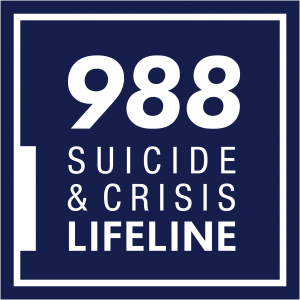Suicide is the second leading cause of death among young people ages 10-24. But there is hope. Education and greater awareness can help save lives.
Did You Know?
-
According to the Youth Risk Behaviors Survey (YRBS) in 2021
- 22% of students had seriously considered attempting suicide.
- 18% reported making a suicide plan
- 10% of youth in grades 9-12 reported that they had made at least one suicide attempt in the past 12 months.
- 3% of all students reported making a suicide attempt that required treatment by a doctor or nurse.
Each year over 1,100 college students ages 15-24 die by suicide while approximately 24,000 attempt suicide.And according to the National College Health Association’s National College Health Assessment in 2022:- 27.6% of students surveyed screened positively for suicidality
- 72% reported experiencing moderate to severe levels of psychological distress
- 2.5% reported a suicide attempt in the last 12 months
Signs Someone May Need Help:
- Isolating
They are not hanging out with friends, hiding and avoiding social situations, and making plans not to be around. They may be having problems with peers and having trouble making friends.
- Trouble in school
They are missing classes, failing in school, having trouble concentrating, overly stressed out or anxious about school.
- Mood/behavior changes
They have changed completely, aren’t acting like themselves anymore, started smoking cigarettes recently or something else that is out of character. Their moods are all over the place and their personality and way of acting is changing dramatically.
- Seems depressed/anxious
They are sad a lot of the time, have low energy, are not taking care of their personal hygiene, having episodes of crying without an obvious reason. They are really stressed out or anxious and not coping, may be agitated and can’t handle criticism.
- Risk-taking/recklessness/self-harm
They are driving irresponsibly, drinking too much, using drugs to excess, using prescription drugs without medical supervision. They are hurting themselves intentionally – cutting, burning, hitting, breaking bones, choking, etc.
- “Talking suicide”
They are communicating thoughts of suicide, texting, tweeting, or saying things like: I wish I were dead; I’m going to end it all; You will be better off without me; What’s the point of living?; Soon you won’t have to worry about me; Who cares if I’m dead anyway?
- Eating issues
They are not eating or are eating to excess, lost or gained a lot of weight in a short period of time.
- Sleeping issues
They are having trouble sleeping, sleeping too much or too little.
- Experienced trauma
They recently went through a traumatic event or are experiencing distress from a past trauma and haven’t gotten help – bad break-up, death or illness of a loved one, rape or sexual assault, domestic violence, child abuse, etc.
- Giving away possessions
They are giving away prized possessions or valuable items like their favorite necklace, movies/music, clothing item, piece of a collection, etc.
The more signs exhibited, the greater the risk. If you see someone exhibiting these warning signs above, get help for them immediately.




